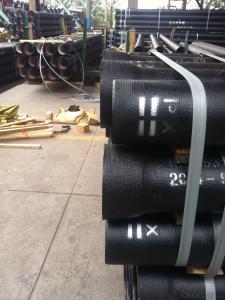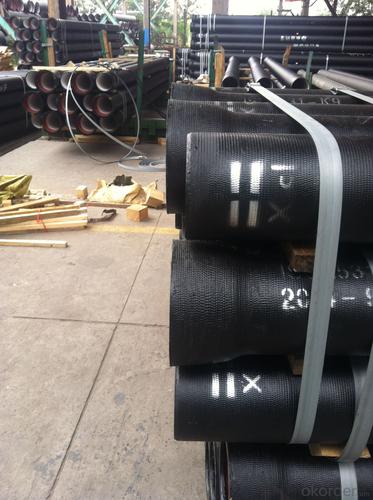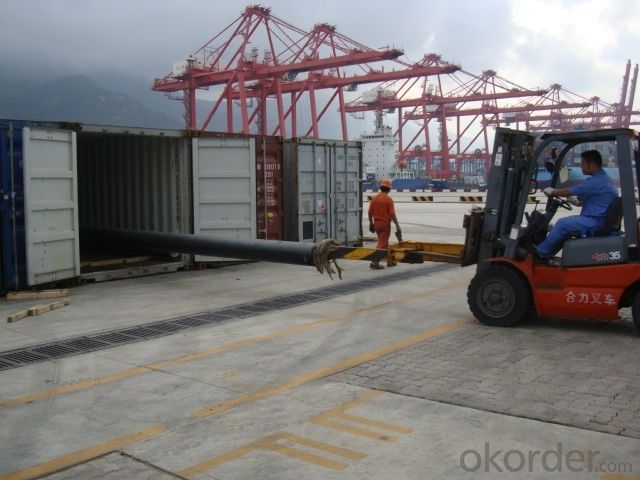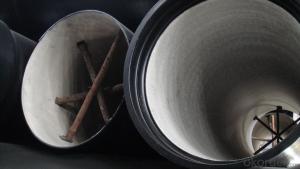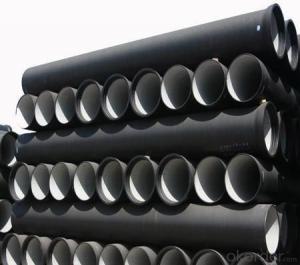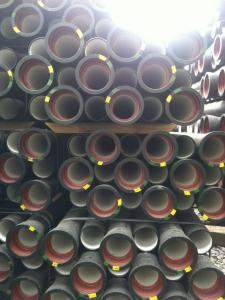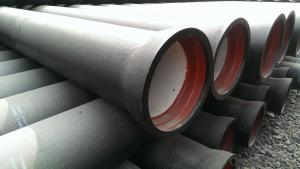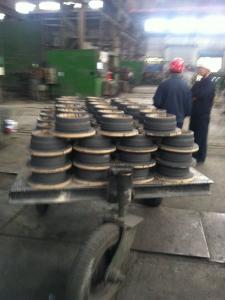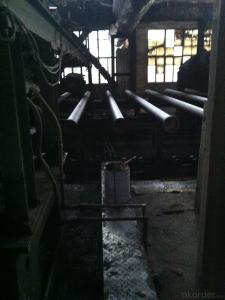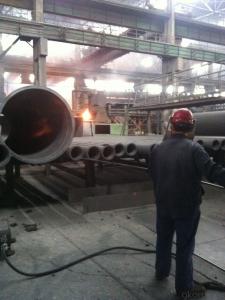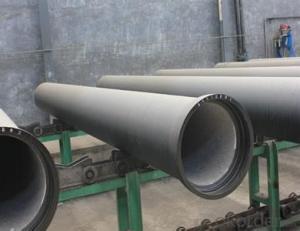DUCTILE IRON PIPES AND PIPE FITTINGS K7 CLASS DN350
- Loading Port:
- Tianjin
- Payment Terms:
- TT OR LC
- Min Order Qty:
- 22 pc
- Supply Capability:
- 3000 pc/month
OKorder Service Pledge
OKorder Financial Service
You Might Also Like
Material : Ductile Cast Iron
Size Range : DN 80mm to DN 2000mm
Unit Effective Length : 6m or 5.7m
Manufacture Standard: ISO 2531:1998/ EN 545:2006/EN 598:2007
Annual capacity : 200,000 tons
Coating Exterior: Zinc 130g/m2 according to ISO 8179-1 and bitumen coating 70 microns.
Cement Interior: Portland Cement/ High Alumina Cement/ Sulphate Resisting Cement Lining according to ISO 4179
Special requirements on external coating and internal lining can be applied
We also provide accessories such as SBR/EPDM rubber gaskets, lubricant paste, pipe caps, PE sleeves, etc.
Additional Parts:
Each pipe is strictly inspected according to related standard to ensure permanently high performance.
Easy Installation at site and service free for life
Long Service Lifespan
Quotation will arrive you within 24hours once we get your inquiry.
We guarantee offering you a competitive price.
A copy of original inspection reports of pipes will be offered after shipment.
Photos of loading process will be sent to the customer after shipment effect.
We will follow-up the delivery progress after shipment effect and update to the customer on weekly basis.
- Q: How does ductile iron pipe perform in high-temperature steam applications?
- Ductile iron pipe performs well in high-temperature steam applications due to its inherent strength and ability to withstand thermal stress. Its high melting point and resistance to corrosion make it a reliable choice for transporting steam at elevated temperatures. Additionally, ductile iron's thermal conductivity helps to dissipate heat efficiently, ensuring the pipe's integrity and preventing potential failures.
- Q: Can ductile iron pipes be used in seismic zones?
- Yes, ductile iron pipes can be used in seismic zones. Ductile iron pipes are known for their strength and flexibility, making them capable of withstanding seismic activities. They have the ability to absorb and distribute the energy generated during an earthquake, reducing the risk of pipe failure or damage. Additionally, proper installation and design considerations, such as using flexible joint systems, can further enhance the seismic resistance of ductile iron pipes in these zones.
- Q: What is the expected pressure rating of ductile iron pipes?
- The expected pressure rating of ductile iron pipes can vary depending on various factors such as pipe diameter, wall thickness, and type of joint used for installation. However, generally speaking, ductile iron pipes are known for their high strength and durability, allowing them to withstand high pressure levels. In most cases, ductile iron pipes are designed and manufactured to meet or exceed the requirements of industry standards such as the American Water Works Association (AWWA) C151 or C115/A21.15. These standards specify the minimum pressure rating for ductile iron pipes, which typically range from 150 to 350 psi (pounds per square inch) for water transmission applications. It is important to note that the pressure rating also depends on the class of the pipe, which refers to the thickness of the pipe's wall. Typically, ductile iron pipes are available in different classes such as Class 50, Class 51, Class 52, etc. Each class has its own pressure rating, with higher classes offering greater strength and resistance to pressure. It is recommended to consult the manufacturer's specifications and guidelines for the specific ductile iron pipes being used to determine the exact pressure rating. It is also essential to consider other factors such as pipe support, installation methods, and operating conditions to ensure the safe and efficient operation of the ductile iron pipe system.
- Q: Can ductile iron pipes be used in areas with high temperature variations?
- Yes, ductile iron pipes can be used in areas with high temperature variations. Ductile iron pipes have excellent thermal conductivity and can withstand a wide range of temperature fluctuations without losing their structural integrity. They have a high coefficient of linear expansion, which allows them to expand and contract with temperature changes without causing significant stress on the pipe. This makes ductile iron pipes suitable for use in areas where there are extreme temperature variations, such as hot summers and cold winters. Additionally, ductile iron pipes have a high resistance to thermal shock, meaning they can handle sudden temperature changes without cracking or breaking. Overall, ductile iron pipes are a reliable and durable choice for areas with high temperature variations.
- Q: Does the cast iron pipe need separate corrosion protection?
- Ductile iron is characterized by its ease of decay and deformation, so if it is not a particular requirement, there is no need to do it alone
- Q: What is ductile iron pipe?
- The main components of ductile iron pipes are carbon, silicon, manganese, sulfur, phosphorus and magnesium. Execution standard GB/T13295-2003ISO2531/2003
- Q: Can ductile iron pipes be used in earthquake-prone areas?
- Yes, ductile iron pipes can be used in earthquake-prone areas. Ductile iron is a flexible and durable material that can withstand seismic activity and ground movements. It has been tested and proven to have high resistance against earthquakes, making it a suitable choice for infrastructure in earthquake-prone regions.
- Q: What are the different types of thrust restraints for ductile iron pipe?
- There are several different types of thrust restraints that can be used for ductile iron pipe installations. These thrust restraints are designed to prevent the pipe from moving or separating under the forces generated by internal pressure, external loads, or changes in temperature. 1. Thrust blocks: Thrust blocks are concrete structures that are typically installed at bends, tees, and other changes in direction in the pipeline. They are designed to resist the thrust forces by transferring them to the surrounding soil or foundation. 2. Mechanical restraints: Mechanical restraints, such as tie rods or harnesses, are used to restrain the pipe by exerting an external force on it. These restraints are typically made of steel and can be adjusted to accommodate changes in pipe length or alignment. 3. Pipe anchors: Pipe anchors are devices that are installed at specific intervals along the pipeline to provide resistance against axial movement. They are usually made of steel and are embedded into the surrounding soil or concrete to provide a secure anchor point for the pipe. 4. Thrust collars: Thrust collars are devices that are installed around the pipe to prevent it from moving or separating. They are typically made of steel and are placed at strategic locations along the pipeline to absorb the thrust forces. 5. Restrained joint systems: Restrained joint systems are specialized pipe joints that are designed to resist axial forces. These joints typically have additional features, such as keyways or wedges, that provide resistance against movement. It is important to select the appropriate type of thrust restraint based on the specific requirements of the ductile iron pipe installation. Factors such as the pipe diameter, operating pressure, soil conditions, and potential external loads should be considered when determining the most suitable thrust restraint system. Consulting with a qualified engineer or pipe manufacturer can help ensure the proper selection and installation of thrust restraints for ductile iron pipe.
- Q: Are ductile iron pipes suitable for installation in areas with high soil settlement and consolidation?
- Ductile iron pipes are generally considered suitable for installation in areas with high soil settlement and consolidation. One of the key advantages of ductile iron pipes is their ability to withstand external loads and accommodate ground movement. Ductile iron pipes are known for their high strength and flexibility, making them more resistant to soil settlement and consolidation compared to other pipe materials. They have a higher tensile strength and can withstand heavy loads and ground vibrations without cracking or breaking. This makes them suitable for areas where the soil is prone to settlement and consolidation. Furthermore, ductile iron pipes have a high resistance to corrosion and can withstand aggressive soil conditions, which is often associated with areas prone to settlement and consolidation. They are also less susceptible to damage from external factors such as roots or rocks, which further enhances their suitability for installation in such areas. It is important, however, to consider the specific conditions of the site and consult with engineers or experts familiar with the local soil conditions. Factors such as the magnitude and rate of settlement, soil type, groundwater levels, and construction methods should be taken into account when determining the appropriateness of ductile iron pipes for installation in areas with high soil settlement and consolidation. In conclusion, ductile iron pipes are generally suitable for installation in areas with high soil settlement and consolidation. Their high strength, flexibility, resistance to corrosion, and ability to withstand external loads make them a reliable choice for such conditions. Nonetheless, it is always recommended to assess the specific site conditions and consult with professionals to ensure the most appropriate pipe material is chosen for each project.
- Q: Can ductile iron pipes be used in coastal or marine environments?
- Ductile iron pipes are applicable for coastal or marine environments. This type of cast iron has been treated with magnesium to enhance its strength, ductility, and resistance to corrosion. As a result, it can be used in environments with high moisture levels, like coastal or marine areas. Coastal and marine environments are characterized by their high saltwater levels, which can lead to metal pipe corrosion. However, ductile iron pipes possess an excellent resistance to corrosion thanks to their protective coating. This coating acts as a barrier between the pipe and the corrosive elements present in saltwater, preventing rust formation and prolonging the pipes' lifespan. Moreover, ductile iron pipes can withstand the high pressures and stresses associated with coastal and marine applications. They possess high tensile strength, enabling them to support the weight of soil, rocks, and other materials that may be present in these environments. Furthermore, ductile iron pipes are resilient to damage caused by external forces like waves or debris, making them a dependable choice for coastal or marine projects. In conclusion, ductile iron pipes are a suitable option for coastal or marine environments due to their corrosion resistance, high tensile strength, and durability. They can reliably transport water or other fluids in these challenging environments while maintaining their structural integrity for an extended period.
Send your message to us
DUCTILE IRON PIPES AND PIPE FITTINGS K7 CLASS DN350
- Loading Port:
- Tianjin
- Payment Terms:
- TT OR LC
- Min Order Qty:
- 22 pc
- Supply Capability:
- 3000 pc/month
OKorder Service Pledge
OKorder Financial Service
Similar products
Hot products
Hot Searches
Related keywords
